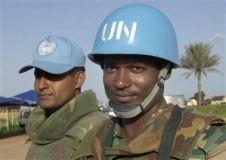US wants UN force to South Sudan extending to Darfur
April 24, 2007 (UNITED NATIONS) — The United States is seeking to use a U.N. resolution that would extend the 12,700-strong U.N. peackeeping mission in southern Sudan to press for a joint new U.N.-African Union peacekeeping force in conflict-wracked Darfur.
 But the U.S. draft is likely to face difficulties from Security Council members who want to keep the peacekeeping operation in the south separate from efforts to create a joint U.N.-AU force in Darfur.
But the U.S. draft is likely to face difficulties from Security Council members who want to keep the peacekeeping operation in the south separate from efforts to create a joint U.N.-AU force in Darfur.
The draft Security Council resolution circulated by the U.S. on Monday would extend the U.N. force monitoring a 2005 peace deal that ended a 21-year civil war between Sudan’s mostly Muslim north and the Christian and animist south for just three months until July 31.
U.S. diplomats said the proposed short extension of the mandate was designed to keep up pressure on Sudanese President Omar al-Bashir to approve a U.N.-AU “hybrid” force to help end the four-year conflict in Darfur, a vast western region about the size of France.
Russia’s U.N. Ambassador Vitaly Churkin told reporters he hadn’t studied the text but said: “At first glance there were some issues raised which do not have to be in the draft resolution.”
Council experts are expected to discuss the draft this week.
The U.S. draft expresses “grave concern” at the continued deterioration of the humanitarian situation in Darfur and “the increasing effects of the violence” in neighboring Chad and Central African Republic.
More than 200,000 people have been killed in Darfur and 2.5 million driven from their homes since fighting began between ethnically African rebels and the Arab-dominated central government in 2003, and the conflict has spilled into the two neighboring countries.
The U.S. draft calls on all parties to implement a “heavy support package” with 3,000 U.N. troops, police and civilian personnel along with six attack helicopters which al-Bashir recently agreed to deploy to Darfur to beef up the beleaguered 7,000-strong AU force on the ground.
It would urge the transition from an AU to a joint U.N.-AU force and express the council’s “intention” to establish the hybrid force. It would authorize the force “to protect effectively civilians under threat of physical violence and prevent attacks against civilians” and to help ensure delivery of humanitarian aid and authorize U.N. “command and control structures” and financial management of the hybrid force.
The proposed U.S. resolution would also strongly back efforts by U.N. and AU envoys to get all rebel groups to sign the Darfur Peace Agreement, which has so far been signed only by the government and one rebel group. It would authorize U.N. assistance to implement the peace agreement.
U.N. Secretary-General Ban Ki-moon has called on the Security Council to allow more time for diplomacy before considering whether to impose further economic and military sanctions on Sudan over the situation in Darfur.
Britain’s U.N. Ambassador Emyr Jones Parry said the United States and Britain have drafted a new sanctions resolution which is “95 percent cooked” and are consulting other council members.
Whether or when the draft resolution is introduced depends on whether Sudan agrees to the hybrid force, he said.
As for the north-south agreement, which ended a conflict in which some 2 million people died, the U.S. draft expresses “the intention to renew it for further periods” beyond July 31.
(AP)
